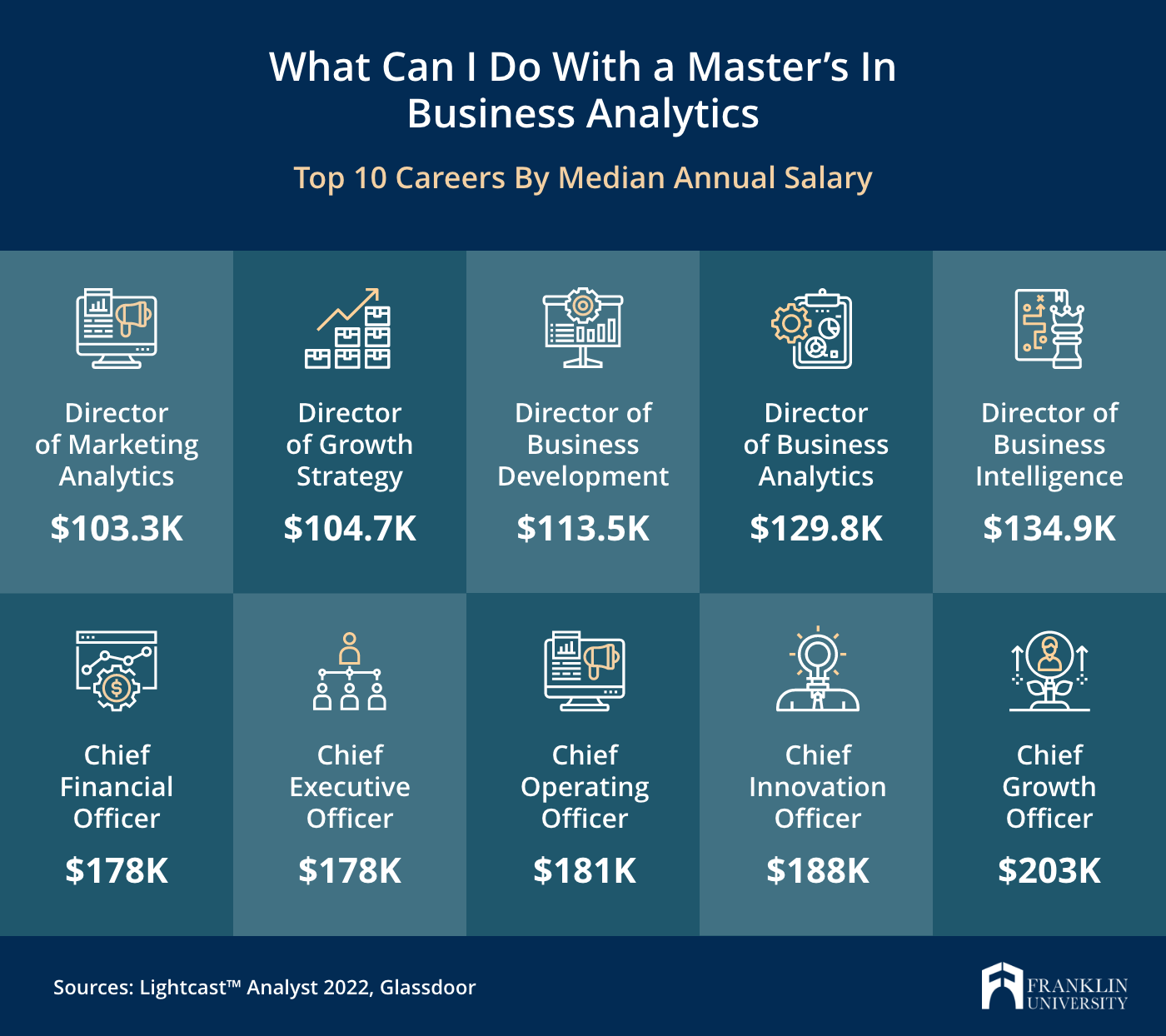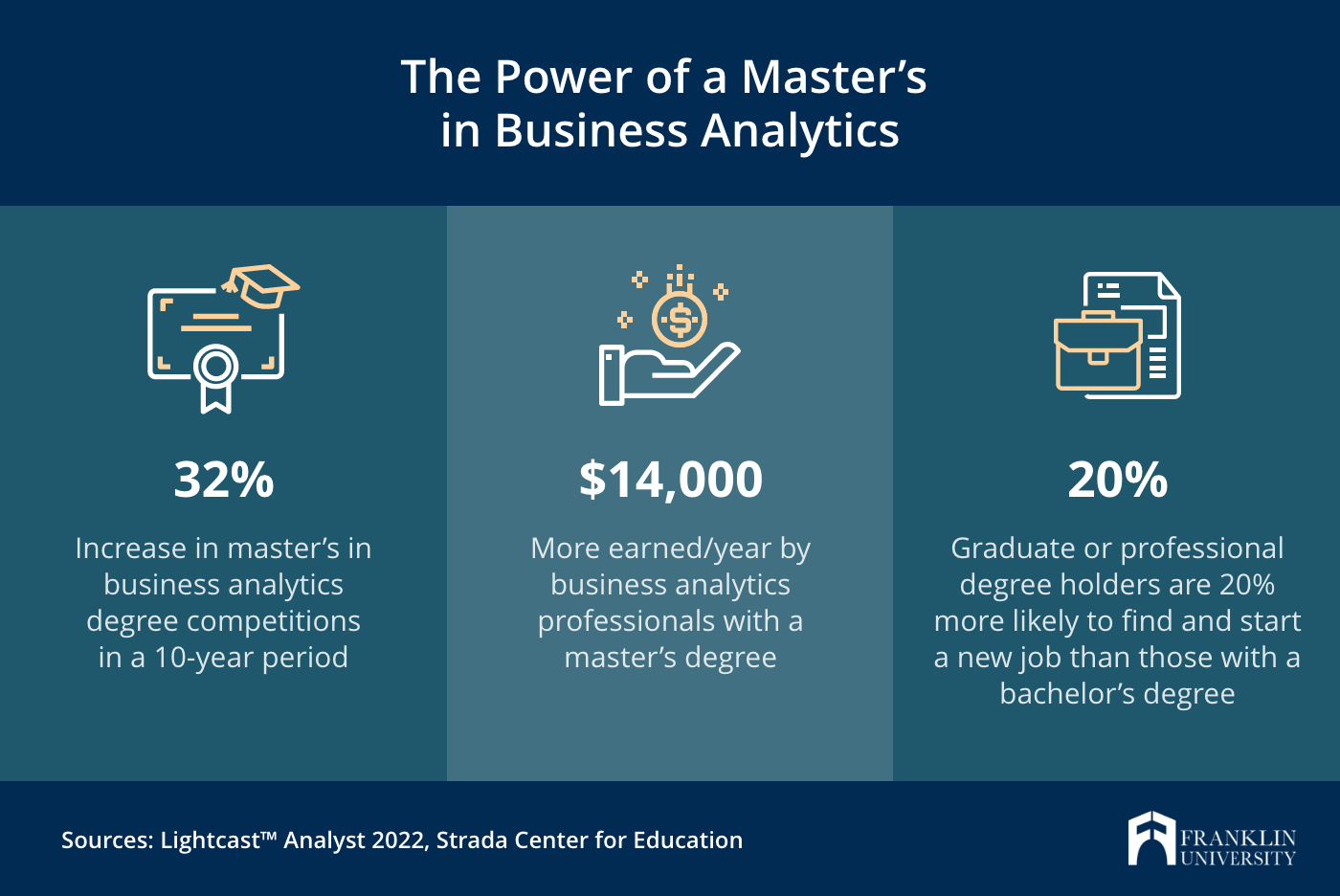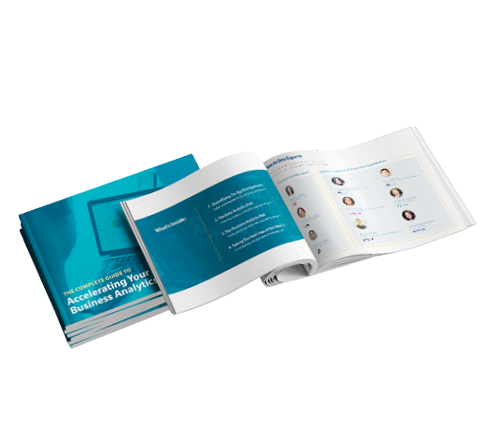Request Information
We're Sorry
There was an unexpected error with the form (your web browser was unable to retrieve some required data from our servers). This kind of error may occur if you have temporarily lost your internet connection. If you're able to verify that your internet connection is stable and the error persists, the Franklin University Help Desk is available to assist you at helpdesk@franklin.edu, 614.947.6682 (local), or 1.866.435.7006 (toll free).
Just a moment while we process your submission.

Is a Master's in Business Analytics Worth it?
Business analytics is a fast growing field and many people are looking to capitalize on its career potential. Like many fields that are expanding, there’s an important point to consider: With an urgent need for business analytics professionals, do I really need a master’s degree to do the work?
When you have a master’s in business analytics, you’ll have an advanced skill set that prepares you to seek advanced job opportunities.
7 Reasons You Need a Master in Business Analytics
“To enter the field, a bachelor's degree is fine,” Jiang Li, Ph.D., chair, M.S. in Business Analytics program and lead faculty, M.S. in the Data Analytics program at Franklin University says. “However, improving your abilities for problem solving, learning advanced analytics methods, and developing analytic skills and tools is critical. To move up the career ladder, a graduate degree is very helpful.”
By earning a master’s degree in business analytics you can grow in 7 key areas.
1. Become an Influencer in Your Organization
In today’s workplaces, master’s degrees in business can prepare professionals with the skills necessary to lead cross-functional or specialized teams.
But earning a master’s degree in business analytics isn’t just about learning new skills — it’s also about widening your field of vision. A strong master’s degree program will set you up for long-term success by equipping you to see the intricacies of data along with the business knowledge needed to understand how that data can make a difference. Being able to see the full picture gives you a seat at the corporate table.
2. Gain Critical Skills For The Future
As you obtain your master’s of science in business analytics (MSBA) you’re going to be learning new skills and processing new understandings of business frameworks.
A graduate program allows you to work in these areas together so you can better understand their relationships. That’s not to say that you can’t gain this knowledge outside of an academic environment but it may take longer and the results may not be the holistic understanding of systems and practices that will help you going forward.
3. Strengthen Your Weak Areas
Some data analytics professionals are strong in business logic while others work well within the technical requirements of the job. A master’s program provides professionals who excel in one area or the other with the opportunity to round-out their skill and knowledge sets. This ultimately makes the student a more “competitive” employee. They can use their newfound skills to straddle the needs of an organization, making them an ideal candidate to grow in their career.
4. Stay Competitive
The National Center for Education Statistics found that over a 10-year period the number of people earning a master’s degree rose by 32%. Of course you shouldn’t do anything just because “everyone else is doing it” but in order to stay competitive, obtaining a master’s degree can be a good career decision.
5. Accelerate Your Upward Mobility
In addition to the knowledge behind it, a master’s degree shows companies that you have made an investment in your career.
“An employer wants to hire someone who will bring value to their organization,” Dr. Li says. “This can take many forms but having the skills and experience behind a master’s degree means that you’re coming in and can hit the ground running.”
6. Increase Your Bottom Line
According to a report by Lightcast™, business analyst professionals WITH a master’s degree make an average of $14,000 more than those professionals with just a bachelor’s degree in similar roles.
7. Build Trust as a Consultant
“A master’s degree gives you the opportunity to gain a comprehensive knowledge of business analytics practices. Many students have learned a lot of the different components when they were in their undergrad classes but this is where everything gets pulled together,” Dr. Li says.
He continues, “Companies realize that business analytics professionals who have earned their master’s degree are not a luxury to have, they are a necessity. That’s because it’s not enough for them to have data that can be ‘eyeballed,’ they need people who can manage, read and understand the data fields.”
A master’s degree not only equips you with skills and knowledge, it also provides you with confidence.
Get a FREE roadmap that includes insider information to help you maximize the many opportunities in the fast-growing field of Big Data.
What Can I Do With a Master’s In Business Analytics

With a Master’s in Business Analytics, you’ll open yourself up to a number of exciting career paths.
- Director of Marketing Analytics | $103.3K: A director of marketing analytics creates strategies that measure campaign effectiveness and enable more informed business decisions. The U.S. Bureau of Labor Statistics predicts a 22% growth in this position by 2030.
- Director of Growth | $104.7K: Identifying and scaling cost-effective customer acquisition strategies across a range of digital channels is one set of responsibilities for the director of growth. This is a fast growing position with an expected growth of 24% in available positions by the end of the decade.
- Director of Business Development | $113.5K: A director of business intelligence will identify and develop new business opportunities, as well as evaluate existing efforts to build on what works and change what doesn't. You can expect a growth rate for this position of about 8% according to the U.S. Bureau of Labor Statistics.
- Director of Business Analytics | $129.8K: Analyzing external markets to determine effective business strategies is a key responsibility for a director of business analytics. They are also responsible for reporting insights to executive leadership. The growth of this position at 14% in the next five years is described as “faster than average.”
- Director of Business Intelligence | $134.9K: The director of business intelligence oversees a team that provides quantitative and qualitative research and reports to aid in business decision-making. As companies continue to find the value in data, people to fill this role are expected to be in high demand.
- Chief Executive Officer | $178K: Managing the overall operations and resources of a company to maintain competitive advantages is the responsibility of the CEO or chief executive officer. CEOs seem to be a position that is always in demand. It’s predicted that there will be an 8% growth in job openings across the next ten years.
- Chief Financial Officer | $178K: In the position of chief financial officer you will be responsible for analyzing the company's financial strengths and weaknesses and proposing corrective actions. There is a steady need for people in this role with a projected growth of about 6% each year.
- Chief Operating Officer | $181K: The chief operating officer analyzes internal operations and identifies areas of process improvement, as well as establishing policies that promote company culture and vision. The U.S. Bureau of Labor Statistics predicts a 8% growth in this position by 2030.
- Chief Innovation Officer | $188K: Managing the process of innovation is the role of the chief innovation officer. They also are responsible for the creation of new ideas within an organization that can be used to increase revenue and gain competitive advantages. Of all the C-Suite roles, demand for chief information officers is expected to grow the fastest with a projected 10-year growth rate of 11%.
- Chief Growth Officer | $203K: Chief growth officer is a relatively new title inside of companies. It's not a standalone marketing position but a role responsible for the collaboration, measurement, and providing leadership for growth initiatives to stay ahead of customer demands. This critical business role is expected to grow at an average rate.
So, is A Master’s Degree in Business Analytics Worth It?
The need for data professionals to manage and interpret data is not just present, it’s growing. Quickly. The U.S. Bureau of Labor Statistics projects a need for 3,000 new data jobs on an annual basis through 2030. While there will be many people pursuing those jobs, a master’s degree helps you to stand out.
Dr. Li says “Having a master’s degree is attractive to a potential new employer because they want someone with the skills and knowledge that come with an MSBA but often don’t want to train up people to prepare them for a role in business analytics.”
An MSBA is a particularly valuable addition to your skills package if you want to grow your career. In fact, if a professional doesn’t pursue a master’s degree at the mid-level career stage, it’s almost essential to pursue one in preparation for senior leadership roles.
Master Your Career Today
Pursuing a master’s degree is one of the most influential decisions you’ll make if you want to advance your career.
Franklin University has an extensive master’s program in business analytics. Utilizing practical labs and projects that are grounded in situational needs, students will have an opportunity to work with peers in studying real-world business problem-solving techniques.
The master’s program at Franklin is constructed for working adults with class times that are flexible and fast. An MSBA can be earned in just 12 months!
Are you ready to advance your career with a master’s degree in business analytics?






